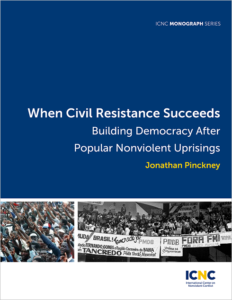Webinar Content
Introduction of Speaker: 00:00 – 4:24
Presentation: 4:25 – 37:46
Questions and Answers: 37:47 – 59:34
Webinar Summary
Based on his new ICNC monograph When Civil Resistance Succeeds: Building Democracy After Popular Nonviolent Uprisings, Dr. Jonathan Pinckney will begin his webinar presentation with the observation that, while several existing studies have pointed to a strong connection between successful campaigns of civil resistance and a greater likelihood of democratization, prominent failures of democratization, as in many of the Arab Spring cases, raise challenging questions. Furthermore, there is scant literature on the dynamics of civil resistance campaigns following the initial democratic breakthrough to trace the mechanisms whereby civil resistance movements can encourage or undermine democratic prospects. In this webinar, Jonathan will present a theory of civil resistance transitions, focusing on a series of strategic challenges faced by nonviolent movements after their initial democratic breakthrough. Jonathan supports this argument in both the monograph and this webinar with a quantitative analysis of all transitions from authoritarianism initiated by civil resistance from 1945-2015 and several qualitative case studies.
Presented by Jonathan Pinckney
Thursday, October 25, 2018
12pm to 1pm (Eastern Time-US)
About the Presenter
 Jonathan Pinckney, Ph.D., is a Research Fellow at the Norwegian University of Technology and Science; and External Associate at the Peace Research Institute of Oslo. His research interests focus on extra-institutional means of political contention, primarily nonviolent civil resistance and political violence. Jonathan’s work has been published in the Journal of Peace Research, Foreign Policy Magazine’s Democracy Lab, and the Encyclopedia of Social and Behavioral Sciences. Jonathan received his B.A, in International Affairs from Gordon College, graduating summa cum laude with special honors, and his M.A. from the Korbel School in 2014. He was a 2012 recipient of the Korbel School’s Sié Fellowship. He is also the author of two ICNC monographs: When Civil Resistance Succeeds: Building Democracy After Popular Nonviolent Uprisings and Making or Breaking Nonviolent Discipline in Civil Resistance Movements.
Jonathan Pinckney, Ph.D., is a Research Fellow at the Norwegian University of Technology and Science; and External Associate at the Peace Research Institute of Oslo. His research interests focus on extra-institutional means of political contention, primarily nonviolent civil resistance and political violence. Jonathan’s work has been published in the Journal of Peace Research, Foreign Policy Magazine’s Democracy Lab, and the Encyclopedia of Social and Behavioral Sciences. Jonathan received his B.A, in International Affairs from Gordon College, graduating summa cum laude with special honors, and his M.A. from the Korbel School in 2014. He was a 2012 recipient of the Korbel School’s Sié Fellowship. He is also the author of two ICNC monographs: When Civil Resistance Succeeds: Building Democracy After Popular Nonviolent Uprisings and Making or Breaking Nonviolent Discipline in Civil Resistance Movements.
Related Resources
https://youtu.be/_GIzbENVoSo
